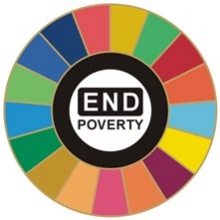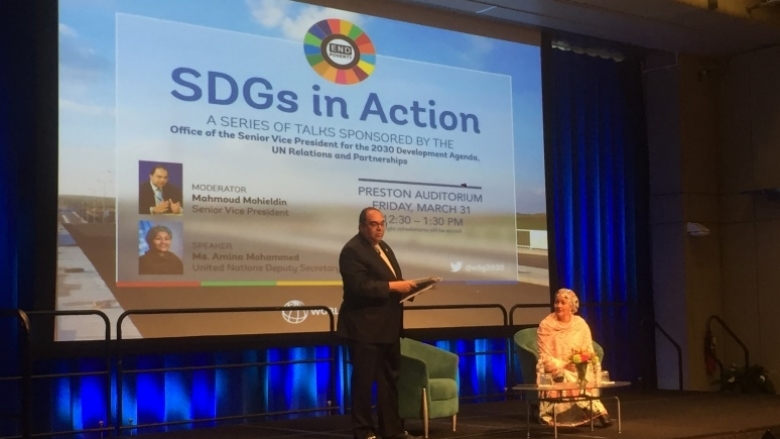Amina Mohammed, United Nations (UN) Deputy Secretary-General, and one of the architects of the Sustainable Development Goals (SDGs), spoke to World Bank Group staff and guests last week about challenges in implementing the SDGs for all development partners, including the UN and World Bank Group (WBG).
This event was one of a series sponsored by the Office of the Senior Vice President for the 2030 Development Agenda, UN Relations and Partnerships, and moderated by its Senior Vice President Mahmoud Mohieldin. Over 100 people participated in the event at Preston Auditorium, including WBG staff, think tanks, CSOs, as well as IMF and UN staff.
See the event video here.
Mohammed said the UN and all partners need to adapt their organizations if we are to reach the ambitious SDGs. “The UN is looking at how, through its own reform process, it can be better equipped at the country level to work with other multilateral institutions to deliver for countries.” She added that partners need to “put countries in the driving seat,” adding that for “some countries…because of their license of capabilities” are “not able to drive the way they need to achieve the results they’ve committed to,” requiring support from the UN, WBG, and other development actors.
One critical ingredient, Mohammed said, is financing, particularly Official Development Assistance (ODA), which can be a catalyst for mobilizing other financial sources, including countries’ own resources (e.g., taxes, fees, and other revenue), as well as from private sector capital (e.g., guarantees, IDA private sector window). “Countries aren’t waiting (for more ODA), they are leveraging financing to grow” adding that these measures have tradeoffs and challenges.
SDG targets are a “compact between government, business, and people,” resulting in “jobs, and opportunities for women in the workplace,” among other benefits. Overall, financing, including de-risking and incentives” need to be “leveraged at scale”. “We’re still at billions or millions,” not the trillions needed to get results at ground level, she said. Regarding the involvement of business in the SDGs, Mohammed said with the SDGs “the penny began to drop that this was in their own interest, that profits could be made in development…(through the) whole value chain.” She said is happy to see recent SDG bond issuances, saying “people are thinking outside the box.”
Mohammed was the first guest for the “SDGs in Action” series of events and seminars which aims to build awareness and generate discussion across the WBG on innovative ways to help countries and the world achieve the SDGs. Over the course of the next several months, Bank Group staff will hear from thought leaders and practitioners on how the 2030 Agenda is shaping development as well as the role of the WBG in supporting this global agenda.
The lessons from the unfinished Millennium Development Goals, (or MDGs) the predecessors of the SDGs, Mohammed said, was that they “weren’t inclusive, didn’t do the whole of development,” and as a result the SDGs are designed to address this shortcoming. She said “the first six SDGs are the unfinished business of the MDGs,” and while the goals apply to all countries, they commit the world to inclusion of those “hardest to reach”, while also integrating financing and climate into its ambition.
Civil society was critical to the formation of the SDGs, and continues to be key to implementation, Mohammed said. Partners need to be “creative about opening up spaces (for CSOs) and involving them,” especially “at country-level implementation” CSOs should “hold us accountable at the UN system and countries themselves.” She also noted that CSOs need to be “fit-for-purpose” and demonstrate “their own accountability”. She said that while NGOs and civil society have “questioned business compacts before”, they are now “part of the process.”
To motivate people to participate more fully in implementing the SDGs, she said “some of us need to spend a week in a famine area…that will motivate you.” She challenged staff to “bring urgency to the work that you do,” and to be “much more proactive” on issues such as gender parity, which a McKinsey report says would deliver “incredible returns”.
Implementing the SDGs requires good data, she said, noting that the data revolution needs to be extended beyond statistical commissions and brought into the workplace, “not for an event but our work.” She added, “we need to give value to collection of data, we need incentives and responsibility, because if the data is wrong then it affects people’s lives.”
The Office of the Senior VP for the 2030 Development Agenda, UN Relations and Partnerships (SVPMM) is the WBG’s primary liaison to the UN system, with offices in Washington, New York, and Geneva. Its staff support extensive interaction between WBG staff and the UN system at every level, aligned with the Twin Goals, as well as the Forward Look strategic direction defined by our Governors. The WBG’s commitments under the “2030 Development Agenda” include Financing for Development, the SDGs, and COP21 (handled primarily by the Climate GP). SVPMM works very closely with global practices, CCSAs, regions, IFC, and corporate units (such as EXC, DFi, OPCS, Treasury, and DEC), particularly in the areas of financing for development, data, and implementation. In the past year, the office has facilitated engagement on issues ranging from the humanitarian-development nexus, famine, and health, to sustainable transport, country-level planning for the SDGs, development cooperation, and many other issues.

